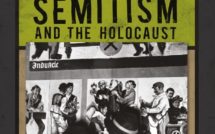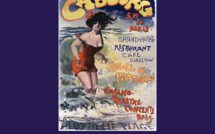

This is part of our special feature on Anxiety Culture.
I was in Reykjavík a few years ago, shortly before Christmas, and reluctantly agreed to have dinner with my father on the only night I didn’t have plans. Those were my last few hours in Reykjavík; my flight back to New York, where I intended to celebrate Christmas with my family, was scheduled at midnight.
I was at the restaurant early, and I followed the freckled waitress to the table we had booked. She had a red ponytail, a charming smile, and we made a little small talk. At first, she addressed me in English (the majority of the customers were tourists), and she found it very impressive that I was living in New York.
“Well, you also have it good, living in Iceland,” I said. “The fresh air … The fresh fish … The fresh drinking water … The fresh, ehm, wind?”
“Yeah, maybe. But it’s also a bit drab and repetitive, right? Anyway, I’m saving up for my Musicology degree in Berlin.”
Just then, my old man came rushing in through the door, a violent storm of red flesh and graying hair. He sent out a deep, satisfied grumble when he spotted me, then proceeded to waddle across the room like a giant duck. He was wearing a red Christmas tie, illustrated with cartoons of the ever-popular Icelandic yule lads––jólasveinar––and a frayed, black leather jacket. Dad was tall and broad-shouldered, certainly a handsome man, but the years had taken their toll. He quickly caught the attention of people at the other tables; French, Chinese, and North-American families who stole curious looks at the colorful, local character who had just arrived to entertain them.
“Well, there he is, the big shot from New York! How are things, stráksi? Is this restaurant glamorous enough for you?”
“The view of the sea is very nice.”
“Yes! This is the most beautiful country in the world. Miss, would you kindly bring me a gin and tonic, please?”
Having ordered his drink, he literally swung me up from my seat and locked me into his broad embrace. I inhaled the familiar, manly odor that had always been both a source of well-being and slight disgust; a combination of cheap cologne, wool, turpentine, sweat, and the Nordic lip tobacco Snus.
“I guess the cosmopolitan wants a Long Island Iced Tea?”
“I’ll have a Coke, please.”
“A Coke!” He laughed; I had no idea why.
After I had exchanged a few platitudes and a few strained smiles with my father, the freckled waitress returned, now carrying our drinks. While she was placing them on the table, my dad leaned in, and discreetly tapped her on the bottom.
“Thanks, honey.”
My eyes came flying out of their sockets.
Blushing deeply, the girl fled to the kitchen, and a sullen man in a suit, wearing a Santa hat (probably the owner), appeared. Politely, but sternly, he asked us to leave the premises. He had, by accident, double-booked the table.
Dad was not happy: “Is this how you treat the locals in our city?” He jerked his head disapprovingly, to emphasize that we were the only Icelanders in the restaurant.
“I am sorry for the misunderstanding,” the owner said. “The drinks are on the house.”
“You think we can’t pay for our drinks? And tell me, is it your policy to reserve every single table for foreigners, and force Icelandic people to leave? Is this how it works now? Come, stráksi! We won’t tolerate this kind of behavior …”
Due to the recent tourism boom, there was now a buzzing restaurant scene by the main harbor. We went into another restaurant, where we were greeted by a strong smell of raw fish and soy sauce. On a wide, red ribbon above over the entrance, was printed (in English): MERRY CHRISTMAS!
The waiter led an Indian family of five to a big table. Dad watched them, silently.
The waiter then turned to us.
“You give them a table before us?” my dad said.
“They had a reservation. There’s now a roughly forty-five minute wait.”
“Of course there is; the locals are neglected while the tourists are pampered. Come, stráksi, we’ll find a restaurant that respects its fellow citizens.”
We walked over to the third restaurant; there, too, every table was taken.
“Do you have a reservation?” a friendly waitress asked, in English.
“Correct me if I’m wrong,” my father said, “but isn’t this an Icelandic establishment? Last time I checked, people spoke íslenska in Iceland, right?”
The waitress stared at my old man. “Excuse me, do you speak English?”
“Jeez, this is outrageous! So, we’re in America now? Come on, stráksi …”
“Dad, I need to catch a plane at midnight, I’m hungry …”
“Yes, and I know exactly where to go: to the best run place in town! Where we can at least expect them to speak íslenska.”
We crossed the street that took us from the harbor and into the center; from there, we went past the flea market and walked through a big parking lot, before, finally, reaching Bæjarins bestu, the famous hot dog stand where Bill Clinton had once satisfied his hunger, as had been well-documented by the local media.
The line spread over the sidewalk, and went on for at least fifty meters.
My dad gaped.
“Do you remember when we used to come here every weekend, before driving to Vesturbærinn for ice cream?”
“Of course I remember. It was our Sunday tradition.”
“A tradition,” he echoed, his voice now low, and broken.
He then inhaled deeply, for courage, and stormed to the front of the line.
“Next, please!” a chubby, pimpled teenager bellowed from hot dog stand.
“Yes, gott kvöld,” my dad said. “Tell me, locals have priority, right?”
“What’s that?”
“My boy and I would like four hot dogs, with everything on them, and two Cokes, please!”
“Listen, you have to line up, man.”
“Are you serious? I have been a faithful customer of this hot dog stand for thirty years. It’s because of people like me that this place stayed in business for decades! And now I need to wait for an hour, behind Chinese people and Canadians, tourists who bought package deals to see Northern lights and geysers?”
Terrified, the boy stared at my father. Then he looked at me, for help. The North-American family behind us was getting angry. A stout, mustached man, sporting a cap that said EXPERIENCE ICELAND, poked my father in the back and claimed to be next in line. My dad jerked, then quickly turned around and grabbed the guy by the collar.
“I’ll give you a memorable Icelandic experience!”
“Dad, I’m not even hungry anymore,” I said, dragging him away before things got out of hand.
I hailed a cab and told the driver I was headed for the bus terminal.
“I’m sorry, Dad, I’ll miss the plane if I don’t get going …”
“Yeah, I guess the big world is waiting for my little boy.” His voice was now barely audible: “Come here, stráksi, at least give me a nice farewell hug. I just wanted to send you off with a proper meal in your belly.”
He dug out his wallet and gave me a thousand krónur bill. “You’ll buy yourself a bag of dried fish in the airport, or at least a tuna sandwich?”
“Dad, I don’t need money … I …”
I thought I could see a few tears running down his rough, leathery cheeks, so I accepted the cash, then signaled to the taxi driver (“Almost ready!”) who was waiting impatiently by the side of the road.
“Merry Christmas, dad.”
“Gleðileg jól, stráksi.”
Through the rear window I watched as my dad grew ever smaller on the sidewalk, before merging completely with the ocean of tourists waiting in anticipation for a taste of the Icelandic specialty: a hot dog with everything. As the driver turned the corner and my dad vanished from view, I realized I had forgotten to give him the Christmas present I had bought for him, a silver watch that was way too expensive anyway. On the flight back home, I watched half an Icelandic drama and two American comedies.
Sverrir Norland has published five books in his native Iceland, including the novels Fyrir allra augum (In Plain Sight, 2016) and Kvíðasnillingarnir (Masters of Anxiety, 2014). He lives in New York with his wife and daughter.
Photo credit: Kristinn Magnusson




